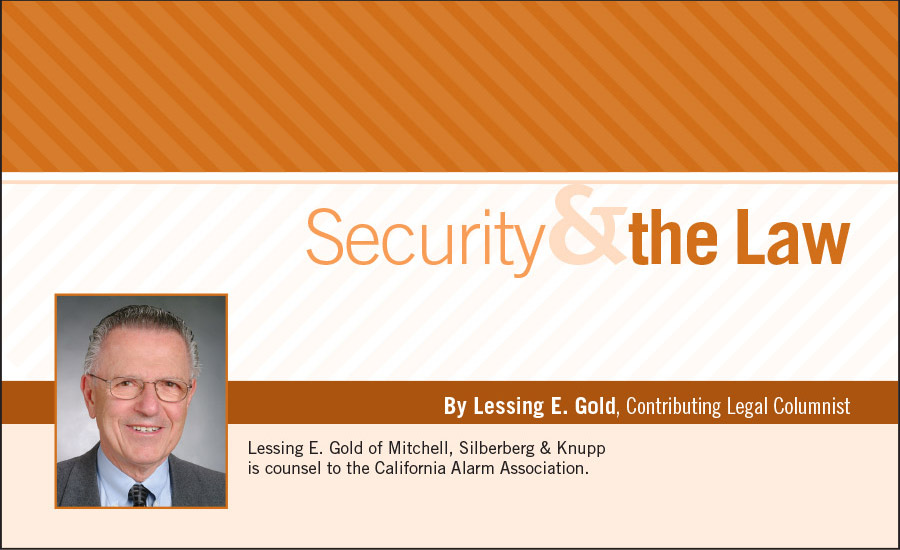A recent case decided in the United States District Court for the District of Nevada involved a residential security system.
The plaintiff, who had a contract with the alarm company, was away from his home when it was burglarized. Around the time of the burglary, the defendant alarm company called the plaintiff and advised that the motion sensing alarm at his home had been activated and a company representative was sent to his home and reset the alarm. The plaintiff inquired from the alarm company as to how they came to their conclusion that it was a false alarm. The defendant simply ensured plaintiff that the alarm was a false alarm or mechanical malfunction.
A couple of hours later the plaintiff received a second phone call from the defendant’s representative that the front door alarm had been activated but that they believed this to be another mechanical malfunction or false alarm and had reset the alarm. The plaintiff again voiced concern that the alarm was not a false alarm and advised the defendant’s representative to call the police. The defendant alarm company’s representative stated that calling the police was unnecessary.
The following day the plaintiff returned home and determined that burglars had indeed entered his home and stolen numerous items from the safe.
The plaintiff filed an action against the defendant alarm company claiming negligence, breach of contract and breach of the implied covenant of good faith and fair dealing.
The defendant filed a motion to dismiss.
The court pointed out that to survive a motion to dismiss, a complaint must do more than assert “labels and conclusions” or “a formulaic recitation of the elements of a cause of action….” A claim will not be dismissed if the court can reasonably infer “that the defendant is liable for the misconduct alleged.”
The defendant argued that the contract between the plaintiff and defendant included an exculpatory clause, which limited damages to $250. The clause stated, “Dealer shall be exempt from liability for loss.” The plaintiff argued that it was ambiguous and that the parties did not intend exculpatory provisions to restrict the defendant’s liability.
Under Nevada law, courts resolve ambiguous release clauses “by examining the intentions of the parties. The court found that in this case the plaintiff can plausibly claim that this clause is not as broad as suggested by the defendant.
The court therefore rejected the defendant’s motion to dismiss.
With respect to the breach of contract claim, the court determined that because Nevada law does not require that plaintiffs plead breach of contract by specifying the specific contract term(s) allegedly breached, the court denied the defendant’s motion.
With respect to the claim for negligence, the plaintiff argued that the defendant owed him a common law duty not to misinform or make negligent misrepresentations or false statements regarding the character of alarm activations at his home.
The court determined that in a previous case the Nevada court found that the alarm company owed a duty of care to its client “not to misrepresent the capabilities of the alarm system installed and that a special relationship arising from the contract can serve as basis for liability for economic or physical injury resulting from reliance upon negligent misrepresentations.” The court further determined that the defendant made negligent, extra non-contractual statements to the plaintiff during their phone calls after the alarms were activated.
With reference to the denial based on the exculpatory clause, one has to wonder whether a limitation of liability provision was included in the contract and whether it was properly pled in the defendant’s motion to dismiss? It will be interesting to see how the ultimate decision comes down. There may well be another appeal in this case once it goes to trial and a judgment is reached.
READER ASK
I am a small alarm company with few employees. I alternate with two of my other employees to be on call each evening in the event we receive an alarm. The employees each work a normal 40 hour week; however, if the employee is on call at night from his home, do I have to pay him overtime beyond his normal 40 hour week and if so, for how many hours?
To read the answer, go to SDMmag.com. Click the Columns tab and select Security & the Law.
To ask Les Gold a question, e-mail SDM@bnpmedia.com.
ANSWER
If the employee is on call and is required to respond to an alarm call after hours and if in fact the employee has put in a 40 hour week, the employee would certainly be entitled to receive overtime compensation for the time that he or she was actually on a call.
There may be some question as to how many hours an employee should be compensated for, but this is probably dependent on what employee’s responsibilities are. The issue is primarily whether the waiting time is for the benefit of the employer or the employee. If an employee can go out to dinner, sleep or determine what he or she can do when not responding to a call, the probability is that the employer is only responsible for the actual time employee spent on the call, including driving time.




